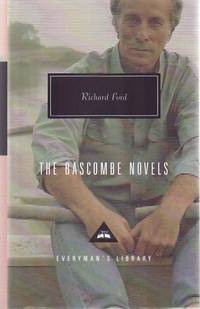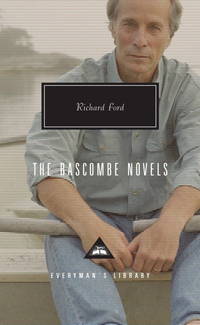Description:
UsedAcceptable. Will show clear signs of use and may include ONE or MORE of the following: water damage to pages, loose binding, loose pages, & worn, bent or torn covers. Used books may not contain supplements such as access codes, CDs, etc. Every item ships the same or next business day with tracking number emailed to you.
The Bascombe Novels: The Sportswriter, Independence Day, Lay of the Land by Ford, Richard - 2009
by Ford, Richard
Similar copies are shown below.
Similar copies are shown to the right.

The Bascombe Novels: The Sportswriter, Independence Day, Lay of the Land
by Ford, Richard
- Used
- Hardcover
- Signed
- first
New York: Everyman's Library, 2009. First edition, first printing. Hardcover. Hardcover. First edition, first printing. A fine book in a fine dust jacket. Richard Ford's trilogy of Frank Bascombe novels--The Sportswriter, Independence Day and Lay of the Land--are collected in one volume in this lovely copy. Signed by the author on a laid in bookplate.
-
Bookseller
Independent bookstores
(US)
- Format/Binding Hardcover
- Book Condition Used
- Quantity Available 1
- Edition First edition, first printing
- Binding Hardcover
- ISBN 10 0307269035
- ISBN 13 9780307269034
- Publisher Everyman's Library
- Place of Publication New York
- Date Published 2009
We have 17 copies available starting at A$9.82.

Stock Photo: Cover May Be Different
The Bascombe Novels: Written and Introduced by Richard Ford (Everyman's Library Contemporary Classics Series)
by Ford, Richard
- Used
- Condition
- UsedAcceptable
- ISBN 10 / ISBN 13
- 9780307269034 / 0307269035
- Quantity Available
- 1
- Seller
-
King of prussia pa, Pennsylvania, United States
- Item Price
-
A$9.82A$3.99 shipping to
Show Details
Item Price
A$9.82
A$3.99
shipping to

Stock Photo: Cover May Be Different
The Bascombe Novels (Everyman's Library Classics & Contemporary Classics)
by Richard Ford
- Used
- Hardcover
- Condition
- Used: Good
- Binding
- Hardcover
- ISBN 10 / ISBN 13
- 9780307269034 / 0307269035
- Quantity Available
- 1
- Seller
-
HOUSTON, Texas, United States
- Item Price
-
A$21.13FREE shipping to
Show Details
Description:
Everyman's Library, 2009-04-14. Hardcover. Used: Good.
Item Price
A$21.13
FREE shipping to

Stock Photo: Cover May Be Different
The Bascombe Novels: Written and Introduced by Richard Ford (Everyman's Library Contemporary Classics Series)
by Ford, Richard
- Used
- Condition
- UsedGood
- ISBN 10 / ISBN 13
- 9780307269034 / 0307269035
- Quantity Available
- 1
- Seller
-
Annandale, New Jersey, United States
- Item Price
-
A$17.60A$3.99 shipping to
Show Details
Description:
UsedGood. Fast shipping and order satisfaction guaranteed. A portion of your purchase benefits Non-Profit Organizations, First Aid and Fire Stations!
Item Price
A$17.60
A$3.99
shipping to

Stock Photo: Cover May Be Different
The Bascombe Novels: Written and Introduced by Richard Ford (Everyman's Library Contemporary Classics Series)
by Ford, Richard
- Used
- good
- first
- Condition
- Used - Good
- Edition
- First Edition
- ISBN 10 / ISBN 13
- 9780307269034 / 0307269035
- Quantity Available
- 1
- Seller
-
Philadelphia, Pennsylvania, United States
- Item Price
-
A$35.20FREE shipping to
Show Details
Description:
Everyman's Library. First Edition. Good. Good. Ship within 24hrs. Satisfaction 100% guaranteed. APO/FPO addresses supported
Item Price
A$35.20
FREE shipping to

Stock Photo: Cover May Be Different
The Bascombe Novels (Everyman's Library Contemporary Classics Series)
by Ford, Richard; Ford, Richard [Introduction]
- New
- Hardcover
- Condition
- New
- Binding
- Hardcover
- ISBN 10 / ISBN 13
- 9780307269034 / 0307269035
- Quantity Available
- 750
- Seller
-
Fairfax Station, Virginia, United States
- Item Price
-
A$35.88A$3.99 shipping to
Show Details
Description:
Everyman's Library, 2009-04-14. Hardcover. New.
Item Price
A$35.88
A$3.99
shipping to

Stock Photo: Cover May Be Different
The Bascombe Novels
by Richard Ford
- New
- Hardcover
- Condition
- New
- Jacket Condition
- New
- Binding
- Hardcover
- ISBN 10 / ISBN 13
- 9780307269034 / 0307269035
- Quantity Available
- 1
- Seller
-
Cambridge, Massachusetts, United States
- Item Price
-
A$37.17A$4.99 shipping to
Show Details
Description:
Hardcover w/ Dust jacket. New.
Item Price
A$37.17
A$4.99
shipping to

Stock Photo: Cover May Be Different
The Bascombe Novels: Written and Introduced by Richard Ford (Everyman's Library Contemporary Classics Series)
by Ford, Richard
- New
- Hardcover
- Condition
- New
- Binding
- Hardcover
- ISBN 10 / ISBN 13
- 9780307269034 / 0307269035
- Quantity Available
- 1
- Seller
-
Alexandria, Virginia, United States
- Item Price
-
A$40.28A$4.00 shipping to
Show Details
Description:
Hardcover. New.
Item Price
A$40.28
A$4.00
shipping to

Stock Photo: Cover May Be Different
The Bascombe Novels (Everyman's Library Contemporary Classics Series)
by Ford, Richard; Ford, Richard [Introduction]
- Used
- Hardcover
- Condition
- Like New
- Binding
- Hardcover
- ISBN 10 / ISBN 13
- 9780307269034 / 0307269035
- Quantity Available
- 750
- Seller
-
Fairfax Station, Virginia, United States
- Item Price
-
A$42.59A$3.99 shipping to
Show Details
Description:
Everyman's Library, 2009-04-14. Hardcover. Like New.
Item Price
A$42.59
A$3.99
shipping to

Stock Photo: Cover May Be Different
The Bascombe Novels: the Sportswriter / Independence Day / the Lay of the Land Written and Introduced by Richard Ford
by Ford, Richard
- Used
- Hardcover
- Condition
- Used - Fine in Fine dust jacket
- Binding
- Hardcover
- ISBN 10 / ISBN 13
- 9780307269034 / 0307269035
- Quantity Available
- 1
- Seller
-
Amherst, Nova Scotia, Canada
- Item Price
-
A$38.74A$9.50 shipping to
Show Details
Description:
Everyman's Library. Fine in Fine dust jacket. 2009. Hardcover. 0307269035 . Tight square unmarked book in barely rubbed dust jacket. ; 5.34 X 2.38 X 8.29 inches; 1352 pages .
Item Price
A$38.74
A$9.50
shipping to

Stock Photo: Cover May Be Different
The Bascombe Novels (Everyman's Library Classics & Contemporary Classics)
by Richard Ford
- Used
- Hardcover
- Condition
- Used:Good
- Binding
- Hardcover
- ISBN 10 / ISBN 13
- 9780307269034 / 0307269035
- Quantity Available
- 1
- Seller
-
HOUSTON, Texas, United States
- Item Price
-
A$53.72FREE shipping to
Show Details
Description:
Everyman's Library, 2009-04-14. Hardcover. Used:Good.
Item Price
A$53.72
FREE shipping to